Tim French
Unifying Causal Reinforcement Learning: Survey, Taxonomy, Algorithms and Applications
Dec 19, 2025



Abstract:Integrating causal inference (CI) with reinforcement learning (RL) has emerged as a powerful paradigm to address critical limitations in classical RL, including low explainability, lack of robustness and generalization failures. Traditional RL techniques, which typically rely on correlation-driven decision-making, struggle when faced with distribution shifts, confounding variables, and dynamic environments. Causal reinforcement learning (CRL), leveraging the foundational principles of causal inference, offers promising solutions to these challenges by explicitly modeling cause-and-effect relationships. In this survey, we systematically review recent advancements at the intersection of causal inference and RL. We categorize existing approaches into causal representation learning, counterfactual policy optimization, offline causal RL, causal transfer learning, and causal explainability. Through this structured analysis, we identify prevailing challenges, highlight empirical successes in practical applications, and discuss open problems. Finally, we provide future research directions, underscoring the potential of CRL for developing robust, generalizable, and interpretable artificial intelligence systems.
NatADiff: Adversarial Boundary Guidance for Natural Adversarial Diffusion
May 27, 2025Abstract:Adversarial samples exploit irregularities in the manifold ``learned'' by deep learning models to cause misclassifications. The study of these adversarial samples provides insight into the features a model uses to classify inputs, which can be leveraged to improve robustness against future attacks. However, much of the existing literature focuses on constrained adversarial samples, which do not accurately reflect test-time errors encountered in real-world settings. To address this, we propose `NatADiff', an adversarial sampling scheme that leverages denoising diffusion to generate natural adversarial samples. Our approach is based on the observation that natural adversarial samples frequently contain structural elements from the adversarial class. Deep learning models can exploit these structural elements to shortcut the classification process, rather than learning to genuinely distinguish between classes. To leverage this behavior, we guide the diffusion trajectory towards the intersection of the true and adversarial classes, combining time-travel sampling with augmented classifier guidance to enhance attack transferability while preserving image fidelity. Our method achieves comparable attack success rates to current state-of-the-art techniques, while exhibiting significantly higher transferability across model architectures and better alignment with natural test-time errors as measured by FID. These results demonstrate that NatADiff produces adversarial samples that not only transfer more effectively across models, but more faithfully resemble naturally occurring test-time errors.
Q-Cogni: An Integrated Causal Reinforcement Learning Framework
Feb 26, 2023



Abstract:We present Q-Cogni, an algorithmically integrated causal reinforcement learning framework that redesigns Q-Learning with an autonomous causal structure discovery method to improve the learning process with causal inference. Q-Cogni achieves optimal learning with a pre-learned structural causal model of the environment that can be queried during the learning process to infer cause-and-effect relationships embedded in a state-action space. We leverage on the sample efficient techniques of reinforcement learning, enable reasoning about a broader set of policies and bring higher degrees of interpretability to decisions made by the reinforcement learning agent. We apply Q-Cogni on the Vehicle Routing Problem (VRP) and compare against state-of-the-art reinforcement learning algorithms. We report results that demonstrate better policies, improved learning efficiency and superior interpretability of the agent's decision making. We also compare this approach with traditional shortest-path search algorithms and demonstrate the benefits of our causal reinforcement learning framework to high dimensional problems. Finally, we apply Q-Cogni to derive optimal routing decisions for taxis in New York City using the Taxi & Limousine Commission trip record data and compare with shortest-path search, reporting results that show 85% of the cases with an equal or better policy derived from Q-Cogni in a real-world domain.
Aleatoric Description Logic for Probailistic Reasoning (Long Version)
Aug 30, 2021
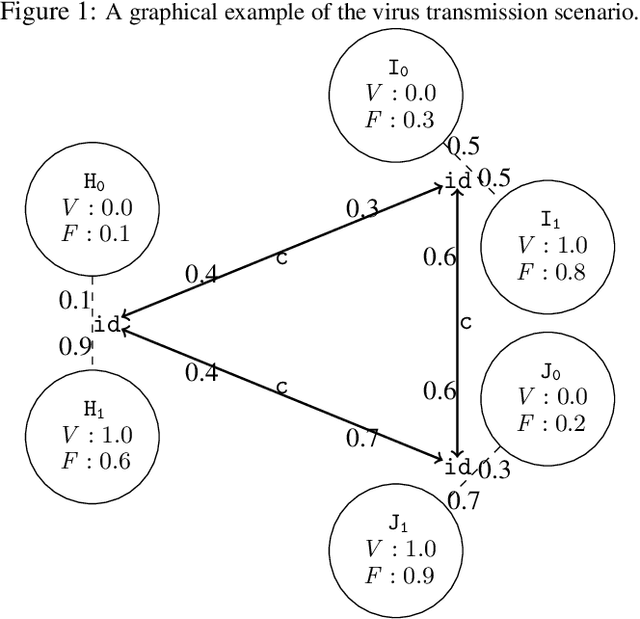

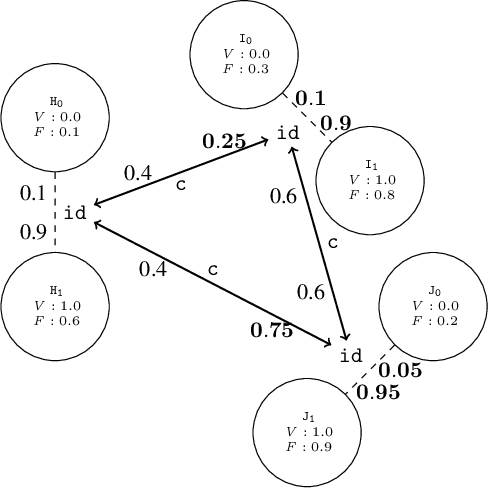
Abstract:Description logics are a powerful tool for describing ontological knowledge bases. That is, they give a factual account of the world in terms of individuals, concepts and relations. In the presence of uncertainty, such factual accounts are not feasible, and a subjective or epistemic approach is required. Aleatoric description logic models uncertainty in the world as aleatoric events, by the roll of the dice, where an agent has subjective beliefs about the bias of these dice. This provides a subjective Bayesian description logic, where propositions and relations are assigned probabilities according to what a rational agent would bet, given a configuration of possible individuals and dice. Aleatoric description logic is shown to generalise the description logic ALC, and can be seen to describe a probability space of interpretations of a restriction of ALC where all roles are functions. Several computational problems are considered and model-checking and consistency checking algorithms are presented. Finally, aleatoric description logic is shown to be able to model learning, where agents are able to condition their beliefs on the bias of dice according to observations.
Refinement Modal Logic
Dec 25, 2013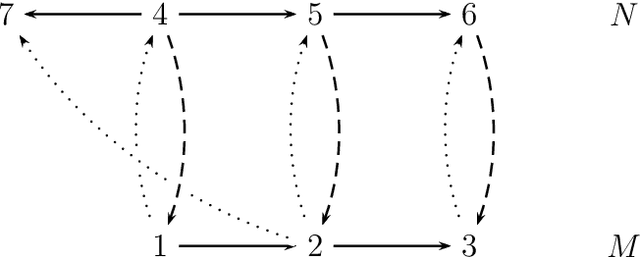
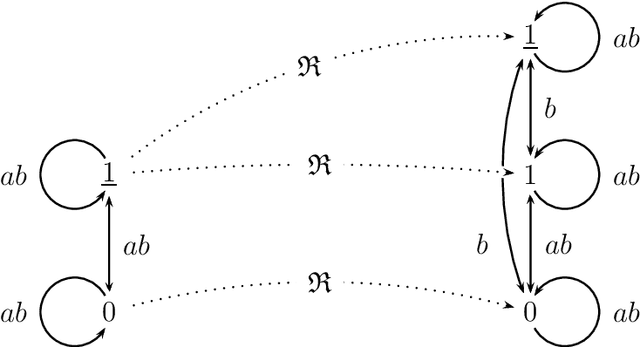
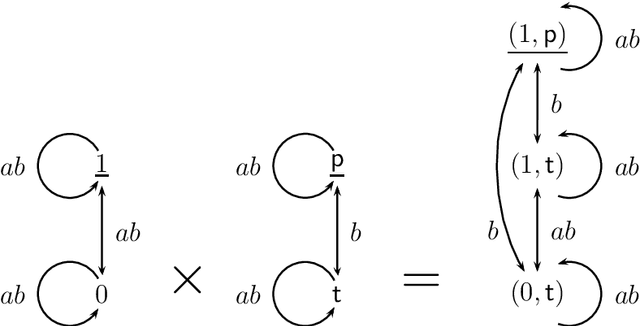
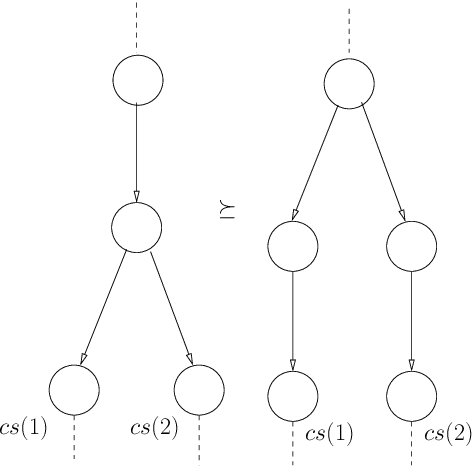
Abstract:In this paper we present {\em refinement modal logic}. A refinement is like a bisimulation, except that from the three relational requirements only `atoms' and `back' need to be satisfied. Our logic contains a new operator 'all' in addition to the standard modalities 'box' for each agent. The operator 'all' acts as a quantifier over the set of all refinements of a given model. As a variation on a bisimulation quantifier, this refinement operator or refinement quantifier 'all' can be seen as quantifying over a variable not occurring in the formula bound by it. The logic combines the simplicity of multi-agent modal logic with some powers of monadic second-order quantification. We present a sound and complete axiomatization of multi-agent refinement modal logic. We also present an extension of the logic to the modal mu-calculus, and an axiomatization for the single-agent version of this logic. Examples and applications are also discussed: to software verification and design (the set of agents can also be seen as a set of actions), and to dynamic epistemic logic. We further give detailed results on the complexity of satisfiability, and on succinctness.
 Add to Chrome
Add to Chrome Add to Firefox
Add to Firefox Add to Edge
Add to Edge